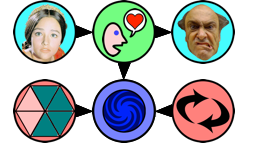Yesterday’s abortive essay led me to considering the verbs that would be used inside clauses; these verbs are the core around which everything else is built. I therefore decided it necessary for me to define those verbs. Here they are:
reveal aura count
reveal aura used last night by another
reveal last night’s victory or defeat
reveal who revealed something about another
reveal who loves, trusts, or fears whom
These verbs must be differentiated from each other. They could all be handled with the verb ‘declare’ like so:
declare character aura count
This is the pay-dirt statement, the one that everybody seeks, but I have to insure that it doesn’t come easily. Nobody does this unless they have a strong motivation to do so. Everything else leads up to this. It can be used inside a subjunctive statement.
declare character dream-combat aura last-night
I’m not sure that this has a lot of value; without knowing the result, the auditor can’t draw much in the way of conclusions. I think I’ll skip this one.
declare (self) dream-combat failure {not} opponent
Again, this has little value without knowing the auras used. Perhaps the aura used by the speaker could be included, as in “I beat Skordokott last night with a katsin-aura.” That would tell the player that Skordokott lost a tanaga. But I don’t think that a character would want to reveal that he gained a tanaga. Best to leave this one out.
declare character declare character aura count self
This is the version of the original Siboot’s ‘betray’ verb. The distinction is that this reveals the actual value revealed, whereas ‘betray’ only specified the nature of the action. I think that this is best done with the verb ‘betray’. Thus, the statement would be ‘declare character betray DirObject’. That’s much simpler and provides a good basis for conflict.
declare character {love | trust | fear} magnitude character
This is an important verb, but should it be confined to first-person expression? Obviously a character should be able to say ‘I {love | trust | fear} Skodokott’, but should he be able to say ‘Locksher {love | trust | fear} Skordokott’? This is the core of Gossip, but does it really work here? What value does this knowledge have for the player? The third-person form is useless, but the first-person and second-person forms – which are the forms used in Gossip – have value.
So I’m left with three verbs: declare aura count, betray, and declare feeling. The only new one is ‘betray’. So here they are:

The last two represent two different ways to present the idea of feelings. The heart with the blue aura in it would come in three versions, one for each aura. The speak with the red heart is probably preferable; it would take an aura as an object, like so:

“Juliet expresses to Chris feelings of much anti-good.”
One other quick item not to forget: I don’t need recursive sentence data structures. More on this later. Enough for now.
